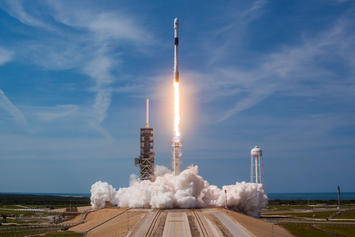
Wow, Elon Musk!
That was the cathartic cheer and cry of relief in millions of American homes on May 30, after two months of forced confinement, when the SpaceX Falcon 9 rocket and Dragon Capsule lifted off from Cape Canaveral carrying two American astronauts bound for the International Space Station. It was the first ever manned SpaceX mission and the first time since 2011 that an American-made rocket had taken Americans into space. SpaceX is of course one of Elon Musk’s companies.
As if on cue on the very next day, Musk’s other monster rocket, Tesla stock, blasted off again and shot out of its range, adding nearly 8 percent to reach $898.10, a level that was more than double its March low of $361.20. Days later, the boosters fired again and lifted the stock above $1,000 and then once more, after a two-week pause, to $1,500, where it is now taking a brief respite in the orbit of companies valued at $300 billion.
There in the stratosphere, the stillness of space envelops the investor as it does the astronaut. Escape velocity has been achieved for shareholders, some with many, many millions in profits, leaving the earthbound shorts (people who bet against the stock) but a small and distant memory to be mockingly blotted out of view.
These shorts, hopelessly weighed down by what’s left of traditional investment discipline, have (so far) lost a cumulative $18 billion in vain expectation that the Tesla rocket would reverse, crash, and burn. All they can do now is stare at their screens and argue to whomever will still listen that this stock rocket will eventually come back to Earth.
Not necessarily. Consider Amazon, Apple, Microsoft, launched long ago and now heading deeper and deeper into the trillion dollar galaxy.
The question then is whether Tesla, though much smaller today, can one day join the outer reaches traveled by these companies, or whether it will crash as so many hot stocks have in the past. Tesla bulls are confident that it can maintain its current trajectory, a belief that is owed in no small part to the faith that they have in Elon Musk.
Read the rest of this piece at Populyst.
Sami J. Karam is the founder and editor of populyst.net and the creator of the populyst index™. populyst is about innovation, demography and society. Before populyst, he was the founder and manager of the Seven Global funds and a fund manager at leading asset managers in Boston and New York.
Photo credit: official SpaceX photo via Wikimedia under Public Domain.












